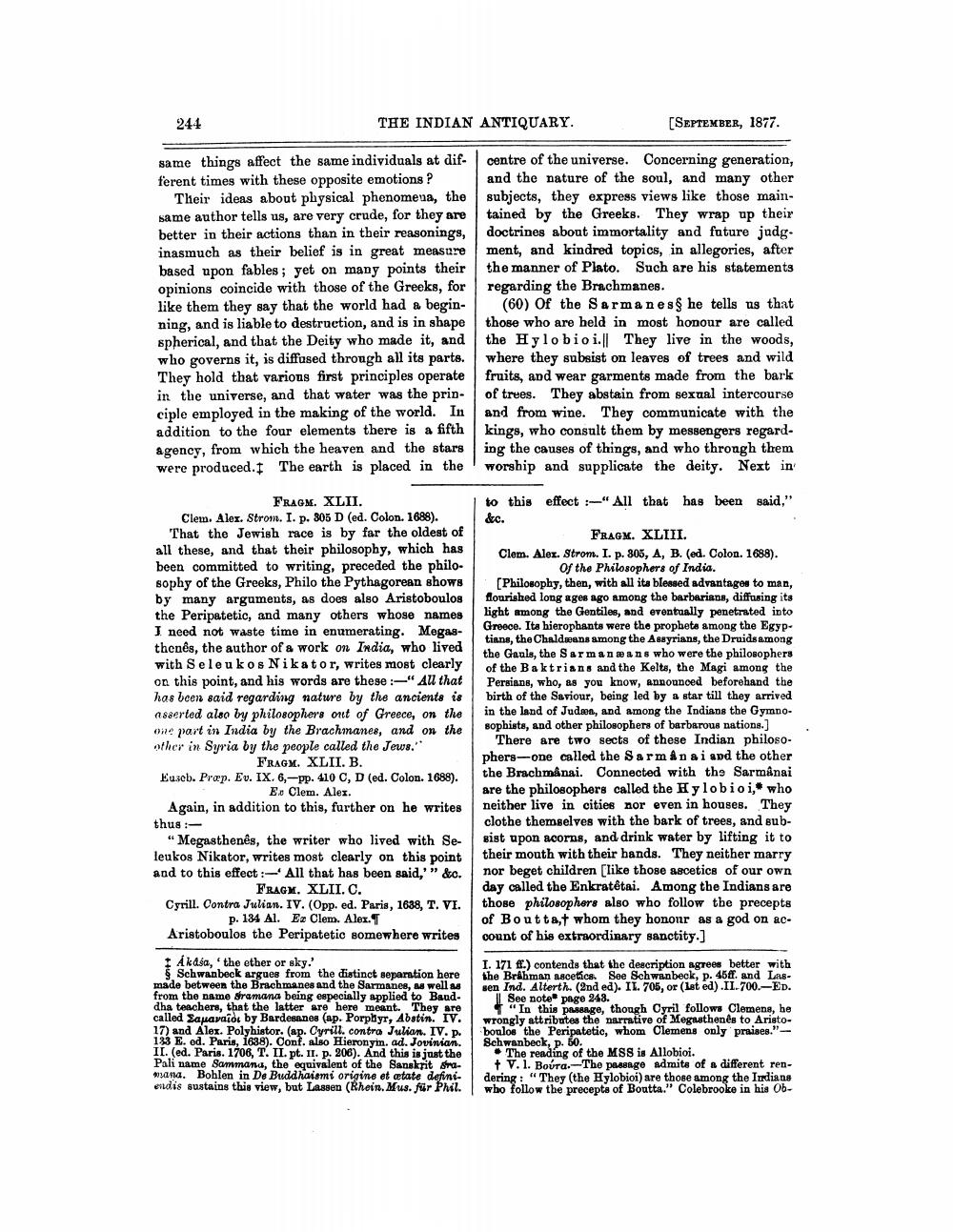________________
244
THE INDIAN ANTIQUARY.
[SEPTEMBER, 1877.
same things affect the same individuals at dif- centre of the universe. Concerning generation, ferent times with these opposite emotions and the nature of the soul, and many other
Their ideas about physical phenomena, the subjects, they express views like those mainsame author tells us, are very crude, for they aretained by the Greeks. They wrap up their better in their actions than in their reasonings, doctrines about immortality and future judg. inasmuch as their belief is in great measure ment, and kindred topics, in allegories, after based upon fables; yet on many points their the manner of Plato. Such are his statements opinions coincide with those of the Greeks, for regarding the Brachmanes. like them they say that the world had a begin-1 (60) Of the Sarmanes he tells us that ning, and is liable to destruction, and is in shape those who are held in most honour are called spherical, and that the Deity who made it, and the Hylobio i.They live in the woods, who governs it, is diffused through all its parts. where they subsist on leaves of trees and wild They hold that various first principles operate fruits, and wear garments made from the bark in the universe, and that water was the prin- of trees. They abstain from sexual intercourse ciple employed in the making of the world. In and from wine. They communicate with the addition to the four elements there is a fifth kings, who consult them by messengers regardagency, from which the heaven and the stars ing the causes of things, and who throngh them were produced. I The earth is placed in the worship and supplicate the deity. Next in
FRAGM. XLII. Clem. Alex. Strom. I. p. 805 D (ed. Colon. 1688). That the Jewish race is by far the oldest of all these, and that their philosophy, which has been committed to writing, preceded the philosophy of the Greeks, Philo the Pythagorean shows by many arguments, as does also Aristoboulos the Peripatetic, and many others whose names I need not waste time in enumerating. Megasthenes, the author of a work on India, who lived with Seleukos Nikator, writes most clearly on this point, and his words are these :-" Au that has been said regarding nature by the ancients is asserted also by philosophers out of Greece, on the one part in India by the Brachmanes, and on the other in Syria by the people called the Jews.''
FRAGX. XLII. B. Euseb. Præp. Ev. IX. 6, pp. 410 C, D (ed. Colon. 1688).
E. Clem. Ales. Again, in addition to this, further on he writes thus:
"Megasthenes, the writer who lived with Seleukos Nikator, writes most clearly on this point and to this effect :- All that has been said,'" &c.
FRAGM. XLII. C. Cyrill. Contra Julian. IV. (Opp. ed. Paris, 1688, T. VI.
p. 134 Al. Ex Clem. Alex. T Aristoboulos the Peripatetio somewhere writes
to this effect :-"All that has been said," &c.
FRAGM. XLIII. Clem. Aler. Strom. I. p. 805, A, B. (ed. Colon. 1688).
of the Philosophers of India. [Philosophy, then, with all its blessed advantages to man, flourished long ages ago among the barbarians, diffusing its light among the Gentiles, and eventually penetrated into Greece. Ita hierophants were the prophets among the Egyp. tians, the Chaldmans among the Assyrians, the Druids among the Gauls, the Sarman sans who were the philosophers of the Baktrians and the Kelts, the Magi among the Persians, who, as you know, announced beforehand the birth of the Saviour, being led by a star till they arrived in the land of Judon, and among the Indians the Gymnosophists, and other philosophers of barbarous nations.)
There are two sects of these Indian philosophers-one called the Sarmånai and the other the Brachmânai. Connected with the Sarmânai are the philosophers called the Hylobioi, who neither live in cities nor even in houses. They clothe themselves with the bark of trees, and subBist upon acorns, and drink water by lifting it to their mouth with their hands. They neither marry nor beget children (like those ascetics of our own day called the Enkratêtai. Among the Indians are those philosophers also who follow the precepts of Boutta,t whom they honour as a god on account of his extraordinary sanctity.]
I Ákasa, the other or sky.'
$ Schwanbeck argues from the distinct separation here made between the Brachmanes and the Sarmanes, Ms well from the name gramana being especially applied to Baud. dha teachers, that the latter are here meant. They are called Sawayaide by Bardesanes (ap. Porphyr, Abstin. IV. 17) and Alex. Polyhistor. (ap. Cyrill. contra Julian. IV. p. 133 E. od. Paris, 1638). Conf. also Hieronym, ad. Jovinian. IL. (ed. Paris. 1706, T. II. pt. II. p. 206). And this is just the Pali name Sammanu, the equivalent of the Sanskrit Sruwana. Bohlen in De Buddhaiami origine et cetate defins. cildis sustains this view, but Lassen (Rhein. Mus. for Phil.
I. 171 ff.) contends that the description agrees better with the Brahman ascetics. See Schwanbeck, p. 45ff. and Lassen Ind. Alterth. (2nd ed). IL. 705, or (Let ed).IL. 700.-ED.
See note page 248.
"In this passage, though Cyril follows Clemens, he wrongly attributes the narrative of Megasthenes to Aristobonlos the Peripatetic, whom Clemens only praises."Schwanbeck, p. 50.
• The reading of the MSS is Allobioi.
+ V. 1. Boura.-The passage admits of a different rendering: "They (the Hylobioi) are those among the Indians wbo follow the precepta of Boutta." Colebrooke in his 06




